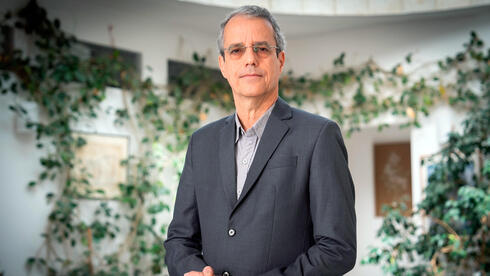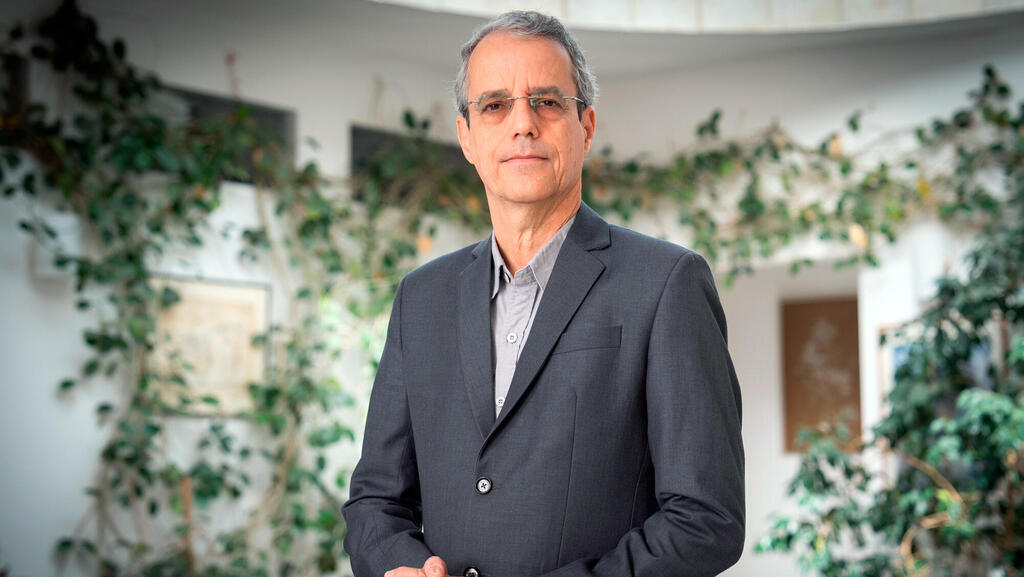
"Israel is the last country to adopt innovative energy technologies"
"I left the position because I understood that the cut is not temporary," says outgoing Chief Scientist at the Ministry of Energy Dr. Gideon Friedmann. In an interview with Calcalist he claims that "in Israel there are not enough breakthrough technologies in the field of climate" and criticizes the regulators who are "afraid to introduce innovations and take risks."
As Dr. Gideon Friedmann bids farewell to his role as Chief Scientist at the Ministry of Energy, he sounds an urgent alarm: Israeli science funding faces a perilous decline. In an exclusive interview, Dr. Friedmann reveals how budget cuts imperil innovation, stifle climate solutions, and jeopardize Israel's future as a tech powerhouse. With candid insights into bureaucratic hurdles and missed opportunities, he makes a compelling case for urgent action to safeguard Israel's position in the global energy landscape.
"This government has decided to harm academic research. This is a wrong move that is not only expressed by cutting the scientist unit at the Ministry of Energy. The cut at the Volcanic Institute is terrible. The government's approach is to cut academic research in Israel. They don't understand how destructive this is to our future. Israel's relative advantage is its technological ability, we are built on high-tech, and high-tech cannot exist without academia. Research and development that comes from academia is the basis for deep-tech fields such as climate and medicine. Without it, we will have nothing to contribute to the world. Research should be strengthened, not weakened."
The budget of the unit you headed was cut by 38% in 2023 under the Netanyahu government. Is that what made you leave?
"When my budget was cut, it was a major trigger for leaving. I understood that it was not something temporary but a matter that would only get worse and I saw no point in continuing. The main meaning of the cut is much less support for research and industrial development. This could cause a crisis in the field in Israel. There are companies that need this support, certainly these days. My strategy as chief scientist was that the budgets should increase, because this is the way to raise Israeli technologies and make the energy economy more advanced and cleaner. This is not a sophisticated vision. It is clear to everyone that money is needed to promote clean energy. With the help of Udi Adiri, who was the CEO at the time, we were able to bring in a lot of money in 2021. The success was not repeated. The Ministry of Finance canceled future commitments given at the expense of the carbon tax, instead of bringing in other budgetary sources. Now the carbon tax is being returned but not the budgets, and it is in tens of millions of shekels per year deducted from the budget.
"Israel is not strong in reducing its carbon. The government said: 'Our contribution to the fight against the climate crisis will come from the development of technologies'. So you have to stand behind these words and bring breakthrough technologies. At the Ministry of Energy we saw that there are not enough of these and there will not be any without the strengthening of research. If a researcher works for a few years in a certain field and then the funding stops - the research will stop. In two years, when you get a budget, the researcher will be somewhere else and all the research they started five years ago will go down the drain."
The Ministry of Finance wants to dismantle the chief scientist's units and establish instead one fund that will allocate budgets competitively. Why is that a bad idea?
"The role of the chief scientist is to connect the office to the economy and the economy to the office. To promote the entry of advanced technologies and to ensure that the market has technological progress that is adapted to the needs of the economy and government policy. These are units that support the minister's policy, they are also part of the decision-making process. The units bring to the office knowledge from abroad, from the economy, from academia. It is important that they be strong and meaningful. Alongside this, in order for the economy to listen to what the government wants to say, it needs to come with a carrot - of supporting the activity and integrating of innovative technologies. If they break it into pieces, it won't work. The right way to support companies and pilots is through the chief scientist: he knows the market well, the policy and regulation and will know how to spend the money in the best way. It is not a rich unit to begin with and quite a few interesting initiatives have come through it in recent years. International collaborations are also something that only the units of the chief scientists can do with their counterparts abroad. We have a successful collaboration with the USA. My desire to expand it did not materialize because there was no money.
"We have established, for example, research institutes for nuclear fusion and energy storage, areas in which we recognize a relative advantage for Israel and great importance. We supported the placement of charging stations for electric vehicles before it became popular, we released a study that already tested in 2016 how many charging stations are needed in the urban area. We did a small pilot to learn how it should be done, and put out a call for subsidies to set up charging stations. This is something that has lifted the market. Then more than ten charging companies appeared that submitted offers in these centers and the market woke up."
Most of the investments today come from the private sector.
"Government investment in Israel in research and development is one of the lowest in the world. In areas such as climate, private investment does not make sense. Usually the risk is very high, the development years are very long - you have to wait 12 years - and the profit share is small. It's not like an investment field of pharmaceuticals or software. The government should lead such an investment. The interest is not only a narrow economic interest: the investor is interested in money, but we want to solve the climate problem. Governments have goals for which the economic logic is not purely commercial."
Does Israel still have an advantage over the world?
"Israeli cultural flexibility gives us an advantage. The term 'Startup Nation' - there is something in it. We have original thinking, we know how to do things cheaply compared to the world. A startup here can exist with $3 million to start and in the USA they cannot manage without less than $10 million. We know how to save money, we don't set up the laboratory until the end, part of it is done at the university, we buy used equipment and more. We are mentally flexible. Bodies abroad are often cumbersome. With us, it is easier for companies to make decisions.
"We are good in the early stages, but our problem is that we fall in more advanced stages. In other fields, we see that the large global companies have established incubators for development in Israel and have accumulated a lot of knowledge in the local arena, and on the other hand, they have allowed Israeli entrepreneurs to acquire managerial and methodological experience that will allow their ventures to grow properly. But in the fields of energy, this has not happened. We lack this stage that comes after the small startup, the stage of bringing a product to the market. We are weak at this. This means that we need to recruit international companies here and give government encouragement. It can happen when the international companies realize that it is possible to do pilots and activities here, and it has real government support.”
The energy market in Israel is outdated compared to the developed world.
"In Israel we are the last to adopt innovative technologies. If you want an advanced energy economy, you cannot say 'we will be the last to implement innovative technologies'. We have a conservative bureaucracy. They don't want to take risks and lead. Ten years ago they said: Why do we need renewable energy in Israel? We will wait, the prices will drop and then we will install. Even if there is something to it, it means that we are always last and this has consequences - also at the level of the local market. Israeli companies have an innovative product but they have nowhere to try it. They go to funds or governments in the world and say to them: 'What, you haven't even tried it at home? Go home, try and come back to us.' But if it is difficult for companies to set up pilots and implement technologies in Israel, then they have difficulty moving forward and growing. We can't easily bring foreign technologies here either, because it's too innovative and no one wants to risk it. If there is no Chief Scientist unit, there will also be no implementation projects to show that more advanced policies are possible and successful pilots. This means we are left behind, again.”
Can Israel reach the renewable energy goals it set for itself? Why aren’t we successful in this arena?
"First of all, you have to want it. When you want to do it, you can. If you don't want to, it's more difficult. There are quite a few projects in the pipeline, you need to make sure that they get off the ground and succeed. For example, the Oron-Zin area in the Negev. A very large area of old and inactive quarries where the ecosystem has been disturbed. The Ministry of Environmental Protection wants to rehabilitate the quarry and return it to nature. The damage has already been done and we need the area to create renewable energy. The story of the Gaza Envelope also casts doubt on the word 'want'. There is potential there for the production of thousands of megawatts of electricity, but the Ministries of Environment and Agriculture oppose the utilization of the areas. The government has to decide what the priorities are. If you want renewable energy, it is definitely possible. A mix should be encouraged: one third on roofs, one third in dual use and one third on land."
What needs to happen to have renewable energy here?
"We need to set a renewable energy goal for 2040 of 60% of all electricity consumption today. This will send a signal to everyone: the electric company and the private gas producers - 'we will have an economy based on renewable energy with the backing of natural gas', not an economy of natural gas with some renewable energy. A target of 60% will make it clear to everyone that the natural gas era will weaken significantly. None of the players in the market has internalized this."















